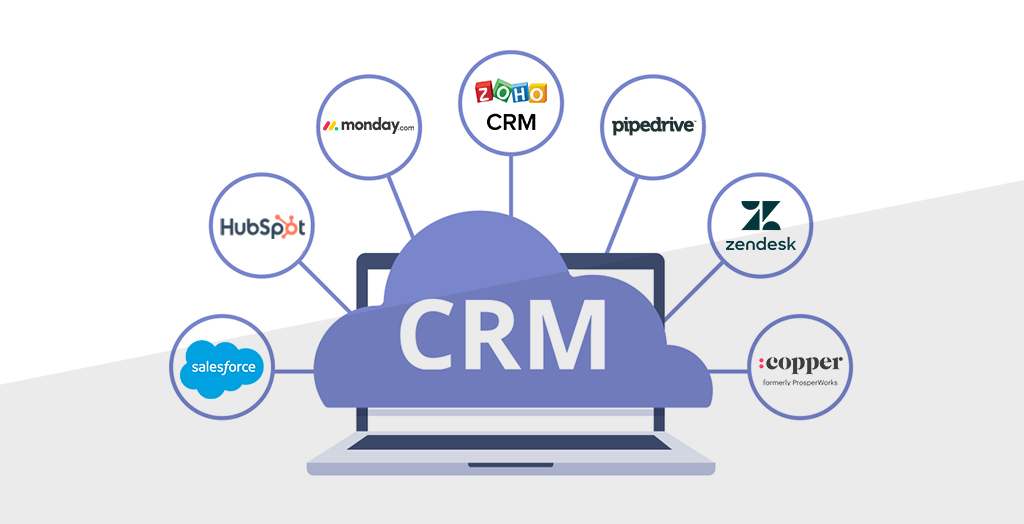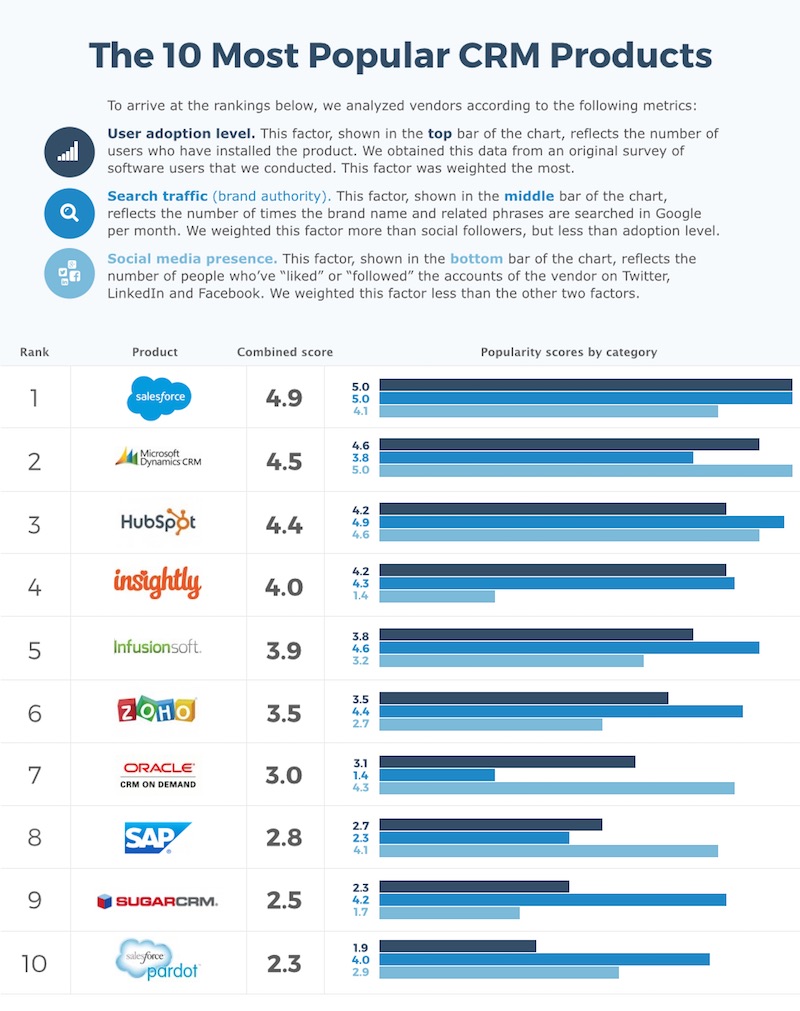CRM software helps businesses manage interactions with customers. Finding the right one can be tough.
Customer Relationship Management (CRM) software is essential for modern businesses. It simplifies processes and improves customer satisfaction. With so many options available, choosing the most popular CRM software can be challenging. Each has its own strengths and weaknesses. Factors like cost, features, and ease of use play a big role.
This blog post will help you understand which CRM software stands out and how to make an informed decision. By the end, you will know what to look for and which CRM might be the best fit for your business needs.

Credit: www.aceinfoway.com
Introduction To CRM Software
Customer Relationship Management (CRM) software helps businesses manage interactions with customers. It stores customer data, tracks communications, and automates sales tasks. Many companies use CRM software to improve relationships with their customers. This software can make a big difference in how a business operates.
Importance Of Crm
CRM software keeps all customer information in one place. This makes it easy for employees to access the data they need. It improves communication within the company. CRM helps track customer interactions over time. This leads to better customer service. It can also help increase sales by identifying potential leads. Businesses can make informed decisions based on CRM data.
Evolution Of Crm
CRM has come a long way. In the past, businesses used paper and spreadsheets to track customer data. These methods were time-consuming and prone to errors. With the advent of technology, CRM systems became digital. Early CRM software was simple and focused on basic tasks. Today, CRM systems are advanced and offer many features. They integrate with other business tools. Modern CRM software uses AI to provide deeper insights. This helps businesses understand their customers better.
Top CRM Software Options
When searching for the most popular CRM software, you have many options. Each CRM software offers unique features to help manage customer relationships. Here, we will discuss some top CRM software options that are highly regarded in the market. Let’s explore these popular choices to help you decide which one fits your needs best.
Salesforce
Salesforce is a leader in the CRM industry. It is known for its robust features and flexibility.
- Customizable dashboards
- Comprehensive reporting tools
- Integration with many third-party apps
Salesforce is ideal for large businesses with complex needs. Its advanced features can handle various business processes.
Hubspot
HubSpot CRM is popular among small to medium-sized businesses. It offers a free version with many useful features.
- User-friendly interface
- Marketing automation tools
- Email tracking and scheduling
HubSpot integrates well with other HubSpot tools, making it a strong choice for businesses looking for an all-in-one solution.
Zoho CRM
Zoho CRM is known for its affordability and ease of use. It is a great option for businesses of all sizes.
- AI-powered sales assistant
- Multichannel communication
- Customizable modules
Zoho CRM offers various pricing plans, making it accessible for different budgets. Its flexibility allows customization to fit specific business needs.
Choosing the right CRM software depends on your business size, budget, and specific requirements. Consider these top CRM options to improve your customer relationship management.
Features Of Leading CRM Software
Choosing the right CRM software can be overwhelming. It is important to focus on essential features. These features can make or break your decision. Below, we will discuss some key features of leading CRM software. This will help you choose the best CRM for your needs.
Automation Capabilities
Automation capabilities are critical in CRM software. They save time and reduce human error. Common automation features include:
- Automated emails
- Task reminders
- Lead scoring
- Follow-up scheduling
These features help keep your team on track. They also ensure no important task is missed. Automated workflows streamline processes, making your business more efficient.
Customization Options
Every business is unique. Customization options in CRM software allow you to tailor the system to your needs. Look for CRM software that offers:
- Custom fields and modules
- Configurable dashboards
- Personalized reports
- Role-based access controls
These customization options enable you to adapt the CRM to your business processes. This ensures that the software fits your specific requirements.
Integration With Other Tools
Integration with other tools is vital for a seamless workflow. A good CRM should integrate with:
- Email platforms
- Marketing automation tools
- Social media networks
- Customer support systems
Integrations allow for data to flow freely between systems. This reduces the need for manual data entry. It also provides a complete view of your customer interactions.
When evaluating CRM software, keep these features in mind. The right CRM will help your business grow and succeed.
Benefits Of Using CRM Software
Customer Relationship Management (CRM) software helps businesses manage customer data. It improves customer interactions, streamlines processes, and boosts profitability. Let’s explore the key benefits of using CRM software.
Improved Customer Relationships
CRM software helps track every interaction with customers. This makes it easy to understand customer needs and preferences. By having a clear view of customer history, businesses can provide personalized services. This improves customer satisfaction and loyalty.
Here are some ways CRM software improves customer relationships:
- Centralized customer information
- Personalized communication
- Efficient follow-ups
- Better customer support
Enhanced Data Management
CRM software stores customer data in one place. This makes it easy to access and manage information. It reduces the risk of data loss and errors. It also helps analyze customer data to make informed decisions.
The benefits of enhanced data management include:
| Benefit | Description |
|---|---|
| Centralized Data | All customer data in one place |
| Data Accuracy | Reduces errors and duplicates |
| Data Analysis | Better insights for decision-making |
Increased Sales
CRM software helps track sales activities and performance. It identifies potential sales opportunities and automates sales tasks. This increases efficiency and drives sales growth.
Key benefits of increased sales using CRM software:
- Automated sales processes
- Sales performance tracking
- Lead management
- Opportunity identification
CRM software is a valuable tool for improving customer relationships, enhancing data management, and increasing sales. Choosing the right CRM software can transform your business operations.
Factors To Consider When Choosing A CRM
Choosing the right CRM software is crucial for any business. The right CRM can streamline operations, improve customer relationships, and boost sales. But with so many options available, how do you make the best choice? Here are key factors to consider when choosing a CRM.
Business Size And Needs
The size of your business plays a big role. Small businesses have different needs compared to large enterprises. A small business might need basic features. Large companies may require advanced functionalities. Identify the specific needs of your business. This will help narrow down your options.
Budget Constraints
Budget is a critical factor. CRM solutions come in various price ranges. Some are free, while others can be costly. Determine your budget first. Then, look for CRM software that fits within your budget. Remember, the most expensive option is not always the best.
User-friendliness
The CRM should be easy to use. Complicated software can lead to frustration and low adoption rates. Look for a CRM with an intuitive interface. It should be easy to navigate. This ensures all team members can use it effectively.
Comparing CRM Software
Choosing the right CRM software can be challenging. Comparing CRM software is essential for finding the best fit for your business. Below, we will discuss three key aspects: pricing models, feature sets, and customer support.
Pricing Models
CRM software pricing models vary. Some offer monthly subscriptions. Others provide annual plans. Pay attention to what each plan includes. Some plans limit the number of users. Others may restrict access to certain features. Determine your budget. Compare the pricing of different CRM options.
Feature Sets
Each CRM software comes with unique features. Basic features include contact management and sales tracking. Advanced features may offer email marketing and automation. Assess your business needs. List essential features first. Compare CRM software based on these features. Ensure the CRM you choose meets your requirements.
Customer Support
Reliable customer support is crucial. Check the support options each CRM offers. Some provide 24/7 support. Others may have limited hours. Look for resources like tutorials and forums. Read reviews about their customer service. Good support can save time and frustration. Ensure you have help when needed.
Case Studies Of CRM Implementation
Implementing Customer Relationship Management (CRM) software can transform a business. It streamlines processes, improves customer interactions, and boosts sales. But, the journey to successful CRM adoption can have its challenges. Below, we explore various case studies of CRM implementation to highlight both successes and hurdles faced.
Successful CRM Adoptions
Many companies have successfully adopted CRM systems. For example, a retail company increased customer retention by 20% using Salesforce. They used its advanced analytics to understand customer behavior. Another success story involves a tech startup. They used HubSpot CRM to automate their sales process. This led to a 30% rise in lead conversion. These examples show how CRM tools can create real business value.
Challenges And Solutions
CRM implementation often comes with challenges. A common issue is user adoption. Employees may resist new systems. To solve this, one company invested in thorough training programs. They saw a rise in user acceptance. Data migration can also be a challenge. One organization faced data inconsistencies when moving to Zoho CRM. They resolved this by using specialized data migration tools. This ensured accurate data transfer.
Tips For A Smooth CRM Transition
Switching to a new CRM software can be challenging. Planning and preparation make the process smoother. Here’s how to ensure a seamless transition.
Training Your Team
Training is crucial for your CRM transition. Make sure everyone understands the new system. Hold training sessions regularly. Use a variety of formats:
- In-person workshops – These allow hands-on practice.
- Online tutorials – These are flexible and can be revisited.
- Documentation – Provide step-by-step guides and FAQs.
Encourage questions and provide support. Create a feedback loop to address concerns quickly.
Data Migration Strategies
Migrating data can be tricky. Plan your data migration carefully:
- Data Audit – Identify what data needs to be transferred.
- Data Cleaning – Remove duplicates and outdated entries.
- Data Mapping – Match your old data fields to the new CRM fields.
Test the migration with a small data set first. Ensure everything transfers accurately before migrating all data.
Ongoing Support
Support doesn’t end after the initial training and data migration. Make sure ongoing support is available:
- Help Desk – Set up a help desk for questions and issues.
- Regular Check-ins – Schedule regular check-ins with your team.
- Continuous Training – Offer refresher courses and updates on new features.
Keep the lines of communication open. This ensures your team feels supported and confident using the new CRM.
Future Trends In CRM Software
The future of CRM software is evolving rapidly. Companies are looking for solutions that provide better customer engagement and drive sales. Staying updated with the latest trends is crucial. Here are some future trends shaping the world of CRM software.
Ai And Machine Learning
AI and machine learning are transforming CRM systems. These technologies automate routine tasks, saving time. They also analyze large sets of data, providing valuable insights. Predictive analytics help businesses forecast customer behavior. This allows for more personalized marketing strategies.
Mobile CRM Solutions
Mobile CRM solutions are becoming a necessity. Sales teams need access to customer data on the go. Mobile CRMs ensure data is available anytime, anywhere. This flexibility enhances productivity. It also improves customer service, as responses are quicker and more informed.
Enhanced Customer Insights
Enhanced customer insights are vital for business growth. Modern CRMs collect data from various sources. This includes social media, emails, and website interactions. Analyzing this data provides a comprehensive view of customer preferences. Companies can tailor their services to meet specific needs. This leads to higher customer satisfaction and loyalty.

Credit: www.marketingprofs.com
Frequently Asked Questions
What Is Crm Software?
CRM software, or Customer Relationship Management software, helps businesses manage customer interactions, track sales leads, and streamline processes. It enhances customer relationships and improves sales efficiency.
Which Crm Software Is Best For Small Businesses?
For small businesses, HubSpot CRM is highly recommended. It’s user-friendly, offers a free version, and provides essential tools for managing customer relationships effectively.
How Do I Choose The Right Crm?
Choosing the right CRM involves assessing your business needs, budget, and integration capabilities. Consider user experience, scalability, and customer support options.
Can Crm Software Improve Sales?
Yes, CRM software can significantly improve sales by organizing customer data, automating tasks, and providing insights. It helps sales teams focus on high-value activities.
Conclusion
Choosing the right CRM software can boost your business efficiency. Compare features, prices, and user reviews. Consider your business needs and team size. Test different options with free trials. Make an informed decision for long-term success. The best CRM for you is one that meets your unique requirements.
Keep your goals in mind and choose wisely. Invest in a CRM that supports your growth.




